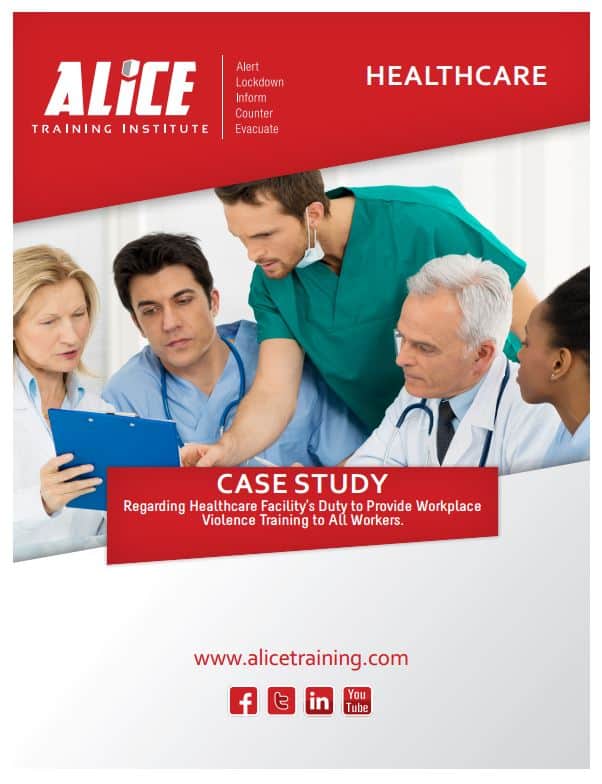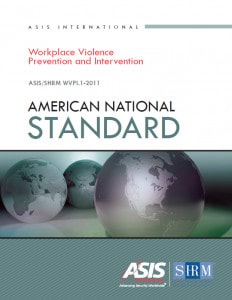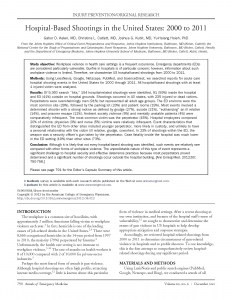Unique Challenges in Healthcare
Active shooter events at a healthcare facility present unique challenges; healthcare professionals may be faced with a decision about what to do with patients; visitors will be present; and patients or staff may not be able to evacuate due to age, injury illness, or a medical procedure in progress. There is no single method to respond to an active shooter event, but prior planning and ALICE training will allow healthcare professionals to choose the best option during an active shooter situation, with the goal of maximizing lives saved.
ALICE can help answer the following questions: What does a healthcare facility do when so many people CAN’T evacuate? There is no way to “Lockdown” every room, how can a hospital “lockdown” or secure in place? Hospitals are limited on staff until help arrives, how would a limited staff counter?
Operational Challenges
If an active shooter incident occurs, hospitals must balance the need for safety and security within continuing to provide care in a therapeutic environment. This means dealing with risk associated with abandoning care versus continuing care under the stress of knowing that an active shooter has not be neutralized. Unlike school shootings that involve lockdown and evacuation, hospitals must still deliver care and ensure patient safety. Operations cannot entirely cease if a shooter is located on one floor. ICU care and OR suites located in different wings of the hospital must still operate, or else suffer the risk exposure of failing to provide requisite medical care.
Financial Challenges
In today’s economy, many hospitals may be struggling financially and thus unable to provide adequate resources, staff and security time, and human resources to provide workplace violence education and training. But shortfalls in these areas could literally be fatal, particularly if personnel perceive they do not work in a safe environment or if administration has not provided policies and procedures to address workplace violence inclusive of the active shooter scenario. Potential risks includes; staff or patient injuries or fatalities, OSHA citations under the General Duty Clause, and damaging media attention.
If your healthcare facility’s only response is Lockdown you’re at odds with the US Department of Health & Human Services.
In 2013, the US Department of Health & Human Services spent considerable resources researching active shooting events. Their findings have resulted in a change in guidance. ALICE protocols are used almost exclusively in all new guidance. Following current federal and safety organizations recommendations is a major step in limiting the liability by demonstrating they have met today’s standard of care.

[Certify your Staff] As part of your Workplace Violence Program.
-
Health care workers rate of assaults is 8 of 10,000 compared with 2 of 10,000 for private sector industries.
-
Nearly 30% of US hospital based shootings occurred in emergency departments.
-
50% of the emergency department’s incidents involved a police or security officer firearm.
LEARN HOW TO CERTIFY YOUR STAFF>>
10 Reasons: Increased Violence in Healthcare Facilities.
According to both OSHA and the Centers for Disease Control and Prevention (CDC), risk factors vary from healthcare facility to healthcare facility depending on location, size, and type of care. Common risk factors for healthcare violence including the following:
News Highlights – Healthcare
READ ALL NEWS STORIES >>
Another Cleveland Clinic Affiliate Chooses ALICE
Ashtabula County Medical Center chose the ALICE program since it was being used at the Cleveland Clinic and matched the training that teachers and students were doing locally. Training was led by the Cleveland Clinic Emergency Management Department and Cleveland Clinic Police Departments in conjunction with local police. Read more
Active Shooter Training at St. Luke’s Hospital
News of the shootings in Oregon and Harrisburg will certainly put a renewed focus on being prepared when there’s an active shooter situation. ALICE Training provided the training and several members of the community were present at Thursday’s “ALICE” seminar that was held at Unity Point Health St. Luke’s Hospital. Read more
Sioux City Hospitals Step Up Security, Active Shooter Training
St. Luke’s and the ALICE Training have teamed up to bring ALICE Instructor Training to St. Luke’s on Thursday, October 1 and Friday, October 2. Matt Max and Jesse Padilla, safety and security coordinator for St. Luke’s, became certified ALICE training instructors to teach hospital staff and St. Luke’s College students strategies they can use when a violent intruder or active shooter enters the hospital. Read more
White Papers – Healthcare
Society of Human Resource Managers
Workplace Violence Prevention & Intervention
Johns Hopkins
Hospital Based Shootings in the US: 2000 to 2011
FBI Report: 10 Takeaways
A Study of Active Shooter Incidents in the US 2000-2013
US Dept. Health Human Services
Active Shooter Incident Planning into Health Care Facility
Over 1,000,000 trained. Let’s see what Some have to Say!
“Fantastic training! Loved the facts and science driving the reasoning.” November 2015
“This was the best training session I have ever attended. I have an entire new perspective on how to react in an active shooter situation. I also will be more aware of my surroundings no matter where I go.” November 2015







